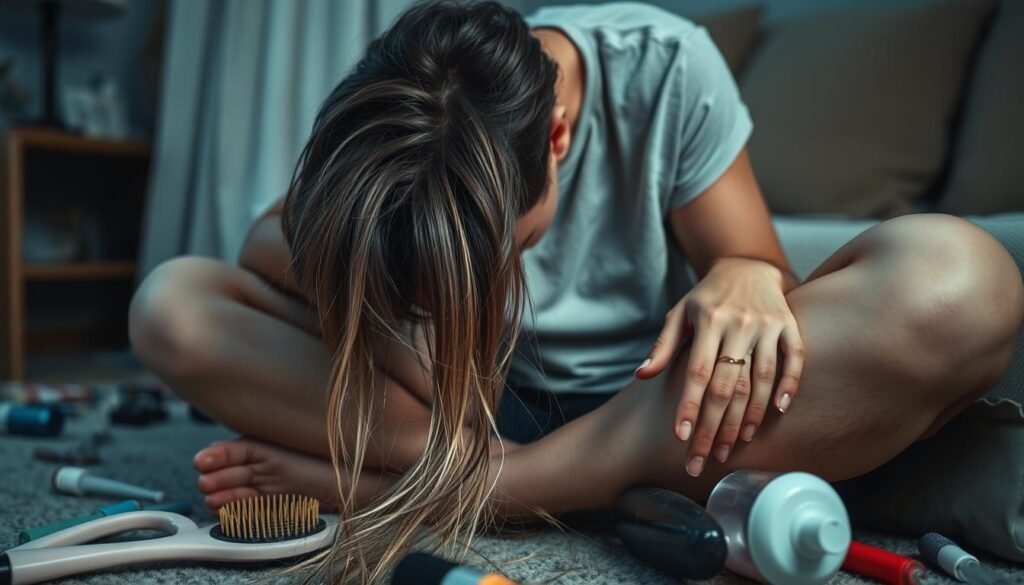Did you know that stress leads to hair thinning or loss in nearly 80% of people? It’s true, and it shows how our feelings affect our hair health. Keeping stress low is essential, not just to look good, but for our self-esteem and living well.
In this article, you’ll learn ways to keep your hair healthy by managing stress. We’ll discuss how stress alters the body and share mindfulness tips. These strategies will help you stay calm and keep your hair strong and healthy.
Key Takeaways
- Stress is a major contributor to hair loss for many individuals.
- Identifying personal stressors is key to effective stress management.
- Adopting a positive mindset can enhance overall well-being.
- Mindfulness and meditation can help reduce stress levels significantly.
- A healthy routine, including physical activity, is essential for hair health.
- Nutrition plays a vital role in combating stress and supporting hair growth.
The Connection Between Stress and Hair Loss
It’s key to grasp how stress leads to hair loss for those worried about hair health. Many elements tie these issues together, like body responses and hormone shifts. Stress can greatly change how hair grows or sheds.
Understanding the Stress Response
Stress triggers the body’s fight-or-flight mode, causing many changes. This response involves a hormone called cortisol. High cortisol can hurt hair roots, affecting hair thickness and where it grows.
How Stress Affects Hair Growth
Studies link stress to hair problems. They show stress’s role in hair loss. Chronic stress moves hair into a loss phase faster. This condition is known as telogen effluvium. Long-term stress makes managing hair loss crucial for regrowth.
The Role of Hormones in Stress and Hair Loss
Stress-related hormones, like cortisol, are big players in hair loss. They mess with the normal hair growth cycle. Knowing how these hormone changes lead to hair loss helps in finding ways to lessen stress. This can improve hair health.
Managing Stress to Prevent Hair Loss
Managing stress well is key to keeping both your mind and hair healthy. Identifying stress sources and keeping a positive mindset are important. These steps help lower stress for the sake of your hair’s health.
Identifying Your Stressors
First, find out what causes your stress. Small daily stressors can add up, affecting your well-being. Tools like journals or questionnaires can help spot these triggers.
Knowing what stresses you allows you to deal with these issues. This helps remove tension at its source.
Adopting a Positive Mindset
Being positive helps lower stress. Daily habits, like being thankful or practicing mindfulness, build resistance to stress. Studies show that staying positive is key to emotional health and reducing stress.
These good habits make handling stress easier. They’re crucial for your mental and hair health.

Using these strategies improves your mood and your hair’s condition. Staying aware and positive helps you face stress confidently. This benefits your overall health.
Effective Stress Management Techniques
Living in a fast-paced world means we must know how to handle stress. Using methods like mindfulness can help us keep stress under control. This leads to a happier life and might even keep our hair healthy!
Mindfulness and Meditation for Relaxation
Mindfulness helps us feel calmer and clearer by making us focus on now. Meditation, a big part of mindfulness, makes managing emotions easier. This lowers our stress. Doing mindfulness exercises every day helps us react better to stressful situations and supports our mental well-being.
Physical Activity and Its Stress-Relieving Benefits
Being active is a great way to fight stress. When we exercise, our body releases endorphins, making us feel good. Whether it’s walking, yoga, or playing sports, staying active boosts our happiness. It also keeps us fit, which is important for preventing hair loss.
Establishing a Healthy Routine
Having a steady daily routine helps us feel secure. Setting regular times for work, exercise, and relaxation lowers our worry. This organized approach is an effective way to manage stress. It brings mental clarity and can even be good for our hair.
| Technique | Benefits | Frequency |
|---|---|---|
| Mindfulness Meditation | Reduces stress, improves emotional regulation | Daily |
| Physical Exercise | Enhances mood, promotes physical health | Several times a week |
| Establishing Routine | Reduces anxiety, fosters stability | Daily |
Stress Management Strategies for Everyday Life
It’s key to manage daily stress well for a happier life. Doing so is crucial when dealing with stress and hair loss. Using practical strategies can make life more balanced.
Time Management to Reduce Overwhelm
Good time management helps lessen the feeling of being too busy. By ranking tasks and setting doable deadlines, you can lower stress. Stress often leads to hair loss. Using tools like to-do lists or planning apps keeps tasks in check. This clear plan helps people focus on important things and boosts mental health.
Building a Support Network
A strong support network is vital for handling tough times. Having people to talk to, like friends, family, or support groups, helps deal with stress. It makes the hard days easier. The American Psychological Association says social ties improve mental health. By sharing your feelings, you can reduce the strain of stress. This may also protect your hair from stress damage.
Asking for advice from different sources is smart when facing stress or hair loss. You might look into stress and hair loss tips. Or learn about how hormones affect hair at this link.
Nutrition and Stress Reduction for Hair Health
Eating right is key to handling stress and keeping your hair healthy. With the correct diet, you can boost your stress resistance and make your hair stronger. It’s very important to know how what you eat affects your health, especially if stress is causing hair loss.
Foods That Combat Stress and Support Hair Growth
Adding foods full of nutrients to your meals can help lower stress. Fruits and vegetables, loaded with antioxidants, fight off stress and nourish your hair. Nutrition for hair health includes foods like spinach, blueberries, and nuts. These improve your mood and strengthen hair roots.
Also, eating fatty fish like salmon and foods high in omega-3, like certain seeds, boosts hair growth by making your scalp healthier. Eating a variety of vitamins and minerals is a great way to reduce stress through food.
The Importance of Hydration
Staying hydrated is essential for hair and stress management. The National Institutes of Health says drinking enough water is critical to deal with stress effectively. It keeps your hair strong and lowers the chance of losing it. Drinking enough water boosts circulation, which helps get nutrients to your hair better.
This leads to healthier hair growth. Plus, a hydrated body keeps your mind at peace, making it easier to manage stress. This makes a big difference in how well nutrition for hair health works.

Coping with Stress and Hair Loss
It’s key to understand how stress and hair loss are linked. By knowing the signs of stress-related hair loss, people can act early. Look for hair that sheds more than usual, feels different, or starts thinning. These signs of stress-related hair loss mean it’s time to take action and make lifestyle changes.
Recognizing Signs of Stress-Related Hair Loss
Seeing the signs early is vital for protecting your hair health. If you’re losing more than 100 hairs a day, it might be stress. Sore scalp or lots of broken hair are also warnings. Catching these signs early can help you recover better.
When to Seek Professional Help
If hair loss doesn’t stop or stress is too hard to manage, get professional advice. It’s critical to know when to seek professional help for hair loss if home treatments or stress relievers don’t work long term. Doctors can offer specific advice, find root causes, and give unique treatments. Getting expert help is a big step towards regaining hair health and controlling stress.

For more tips on dealing with stress and its effect on hair, read this helpful article. It offers great strategies and advice from professionals.
Hair Loss Prevention Tips for Healthy Hair
Using natural remedies and taking good care of your scalp can help keep your hair healthy. Doing so can also reduce stress. Making small changes can bring big improvements in the health of your hair.
Natural Remedies for Stress Relief
There are many natural remedies for hair health that can also ease stress and boost hair growth. Essential oils like lavender and rosemary can calm your mind and help your scalp. Using these oils while relaxing can make the environment soothing and nourish your hair roots.
Scalp Care and Its Role in Hair Health
Taking care of your scalp is crucial for preventing hair loss. Massaging your scalp can improve blood flow and make hair roots stronger. Studies show that regular scalp massages can reduce hair loss caused by stress. Using stimulating shampoos and natural conditioners helps keep the scalp healthy, which is key for strong hair.
To learn more about natural ways to prevent hair loss, check out this resource.
| Natural Remedy | Benefits |
|---|---|
| Lavender Oil | Reduces stress, promotes relaxation |
| Rosemary Oil | Enhances scalp health, encourages hair growth |
| Scalp Massage | Improves circulation, strengthens hair roots |
| Incorporating Aloe Vera | Moisturizes scalp, reduces dandruff |
Creating a Calm Environment
Stress levels can really affect your hair. Creating a calm space helps with relaxation and wellness.
Decluttering for a Stress-Free Space
Keeping your space tidy helps your mind stay clear. Studies show that less clutter means more calmness and control. This makes it easier to look after your mental and hair health.
Incorporating Nature into Your Daily Life
Adding natural elements to your space is beneficial. Houseplants improve air quality and make you feel peaceful. Being around greenery lowers stress and helps you relax, which is good for your hair.
| Environmental Factor | Impact on Stress | Effect on Hair Health |
|---|---|---|
| Decluttering | Reduces mental clutter | Promotes self-care habits |
| Incorporating Plants | Enhances air quality | Supports overall wellness |
| Natural Light | Boosts mood and energy | Aids in hair vitality |
| Scented Candles | Fosters relaxation | Encourages a calming atmosphere |
Conclusion
Managing stress is key to keeping your hair healthy. This article showed how stress impacts hair growth. It also shared ways to handle stress better to reduce hair loss.
Knowing what stresses you out and using methods like mindfulness can help calm your mind. Activities and a healthy daily routine play a part too.
Eating foods that help with stress and staying hydrated are important for your hair’s health. Also, having a supportive space and clearing clutter can improve your mental state. This helps your hair too.
To wrap it up, keeping your mind at peace and using stress management techniques are crucial for healthy hair. By sticking to these strategies, you can fight off hair loss caused by stress. This leads to a life full of confidence and vibrancy.